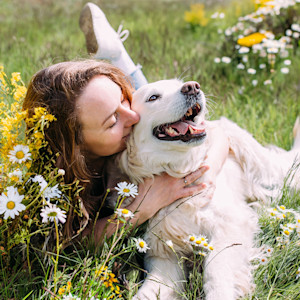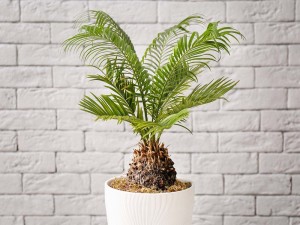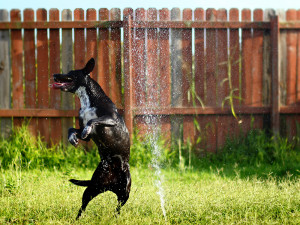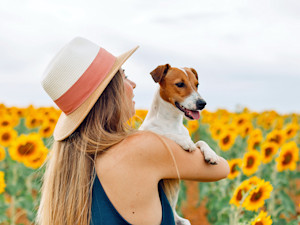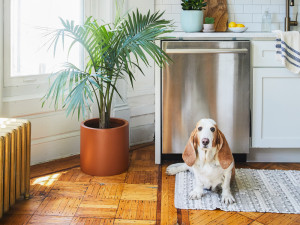Are Roses Toxic to Dogs?
By any other name, it would smell as sweet. But what if your dog nibbles some?

Share Article
Roses are not considered toxic to dogs. Dogs can get stomach upset from eating any plant, however. And roses are no exception. There are some plants that have “rose” in their name that can be toxic to dogs.
Roses are easily recognizable and are often used to spruce up flower arrangements, help beautify gardens, or show love and appreciation for a loved one. Cautious pet parents should always check if flowers and plants that they’re bringing into their home environment are non-toxic before their dog is exposed to them.
Are roses dangerous to dogs?
True roses of the Rosa genus are not toxic to dogs. Rose petals are edible, but they can still cause vomiting in some dogs if eaten. There’s no good reason to feed your dog rose petals though, so avoid the urge to fancy up your dog’s food with a decorative topping. Despite being non-toxic, roses can pose some dangers to dogs.
As gardeners and ’80s hair metal fans know, every rose has its thorn. These thorns can pose a danger to dogs trying to chomp down on a rose or run and play around rose bushes. There’s even a fungal disease, commonly known as rose gardener’s disease (sporotrichosis), that can affect dogs. The fungi that cause the disease are a common soil contaminant and can be inoculated through any puncture wound, not just wounds from rose thorns.

Some plants that are not true roses have the word “rose” in their names. This can cause confusion, so it’s always good to know the taxonomic name of a plant when trying to determine if it’s toxic. Some false roses that can cause problems for dogs include the following:
Easter Rose (Helleborus niger): Also called the Christmas Rose (Helleborus niger), this plant can cause vomiting, diarrhea, drooling, and lethargy in dogs.
Moss Rose (Portulaca oleracea): These colorful flowers can cause oral irritation, drooling, kidney failure, and tremors.
Rose of Sharon (Hypericum calycinum): There are two different plants called Rose of Sharon. One is a hibiscus that is non-toxic to dogs. The other is a relative of St. John’s Wort, which can cause sensitivity to light and skin irritation.
Finally, rose food can be toxic to dogs, depending on the ingredients. Most rose foods just cause vomiting and diarrhea, but some contain insecticides like disulfoton that are quite dangerous to dogs. Always check all ingredients of products that you’re adding to your garden to make sure they are pet-friendly.
What should I do if my dog has eaten roses?
If your dog has eaten a true rose, don’t panic. Because roses are not toxic, it’s best to just take a wait-and-watch approach. Most dogs will digest and pass rose petals without issue, but some dogs may experience enough stomach irritation to cause an episode of vomiting. Contact your veterinarian if your dog has multiple bouts of vomiting or shows any other signs of discomfort or illness after eating a rose.
You should also talk to your vet if you’re concerned that your dog has eaten the thorny stem of a rose. It’s not usually recommended to induce vomiting after sharp objects have been ingested due to concern about them causing damage on the way up. Your vet can help guide you on the best course of action and inform you about problems to watch for.
If your dog has eaten one of the toxic false roses, contact an animal poison control center or your vet’s office. They can recommend care appropriate for the type and amount of plant material that your dog has eaten. Most small ingestions of these plants will not cause major issues, but some dogs can get very sick from plant toxicities.
Diagnosing plant poisoning in dogs
Plant poisonings are most easily diagnosed by witnessing ingestion of the plant or finding evidence that a plant has been damaged. Look for evidence of problems like disrupted pots or flower beds, chewed leaves or stems, or tracking of soil in the area around the plant. Keeping a list of what plants are around can help you and your vet figure out what your dog has gotten into.
Symptoms of plant poisoning in dogs
Fortunately, eating roses is unlikely to cause problems for your dog. While the flowers could cause some direct irritation to the stomach and trigger vomiting, there are no toxins in roses that affect dogs.
Dogs who eat or dig in soil that contains or has been treated with certain insecticides can get organophosphate poisoning. The symptoms of this can be quite severe and may include:
Constant drooling
Decreased heart rate
Difficulty breathing
Vomiting
Diarrhea
Muscle tremors
Changes to pupil size (very big or very small)
Increased or decreased body temperature
Increased tear production
Increased urination
Treatment
Rose ingestion will not require any treatment in most cases. Dogs with protracted vomiting may need an anti-nausea medication to settle their stomach and fluids to help restore hydration. Insecticide ingestion can cause a severe toxicosis that requires hospitalization and intensive care.
How to prevent plant poisoning
The best way to prevent plant poisoning is to screen plants before adding them to your environment. Even dogs who have not shown any interest in eating plants previously may be intrigued by the smell of a new plant and decide to take a taste. Being proactive about making sure your home is pet-friendly is the best way to keep your dog from getting sick from a toxin.
Are all parts of roses safe for dogs?
Roses do not contain any substances that are toxic to dogs. Rose petals can cause some stomach upset that results in vomiting. Rose stems have thorns that can cause punctures or lacerations in dogs who are overly rambunctious around rose bushes.
How do I stop my dogs from eating roses?
Some dogs love to explore the world with their mouths, so training is key to prevention. Use positive reinforcement tactics to direct your dog’s attention away from plants or gardens. If your dog is persistent about sampling flowers, keeping them out of reach is the best bet. You can either place them on a surface that is too high for your dog to reach or keep them in a room or area that your dog doesn’t have access to.
The bottom line: Are roses poisonous to my dog?
Roses are not poisonous to dogs. They’re a great non-toxic plant that you can feel good about bringing into your home with your pets. Always use caution when introducing new plants into your house and make sure that you limit your dog’s access to them, even if they aren’t toxic.
Other plants that are safe for dogs
Spider plants (Chlorophytum comosum) are one of the most popular and easiest-to-maintain houseplants. They look great in any space and are non-toxic to dogs.
Pilea peperomioides (aka the UFO plant or pancake plant) has unique leaves that make it a hit among plant growers. It’s easy to care for and safe for dogs to be around.
Rattlesnake plants (Calathea lancifolia) have patterned leaves that can be reminiscent of snakeskin. Despite their venomous name, these plants are safe to have with dogs in the house.
Other plants that are dangerous for dogs
Sago palms (Cycas revoluta) are one of the most dangerous plants to have around dogs and are a common part of landscaping. All parts of the plant are toxic. Sago palms can cause liver failure and result in death quickly.
Peace lilies (Spathiphyllum) are a common household plant and hold up well to beginner plant parents. These plants contain microscopic crystals that can be very irritating to a dog’s mouth, esophagus, stomach, and intestines if eaten.
Snake plants (Sansevieria trifasciata) contain saponins, which are compounds that can cause vomiting and diarrhea in dogs. Keep these spiky plants away from your dog to prevent problems.
FAQs (People also ask):
What happens if my dog eats a rose?
Roses are not toxic to dogs, so no major problems are expected if your dog eats a rose. Some dogs will experience mild stomach upset due to irritation from the plant material.
Can dogs eat rose petals?
Dogs should not be fed rose petals because there are no health benefits from them, and they could cause some mild stomach upset. Roses are not toxic though, so don’t panic if your dog sneaks a bite.
Are roses poisonous to dogs if they smell them?
Feel free to let your dog stop and smell the roses: there are no risks in letting your dog investigate this non-toxic plant.
References:

Dr. Bartley Harrison, DVM
Dr. Bartley Harrison is a veterinarian with more than 19 years of experience. He has treated a variety of species in emergency and speciality practices for both large and small animals. His primary interests as a vet are emergency medicine and critical care.
Related articles
![woman holding dog among sunflowers]()
Are Sunflowers Toxic to Dogs?
They are the best part of late summer. Can your pup take a sniff?
Are Hibiscus Plants Toxic to Your Dog?
They’re bright and pretty—just like your pup. But are they safe?
![Basset Hound sitting in a bright sunny apartment beside a potted palm tree]()
Garden Variety: Plants Safe for Our Pups
Boutique NYC nursery The Sill gives us the dirt on dog-friendly plants.


